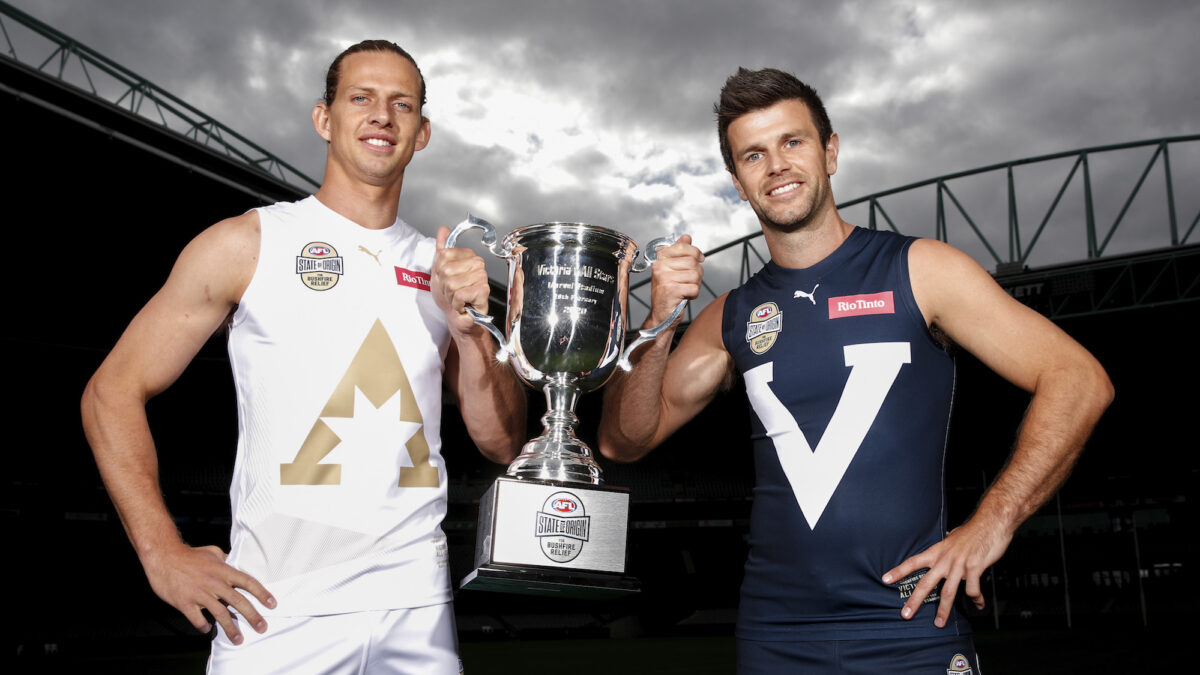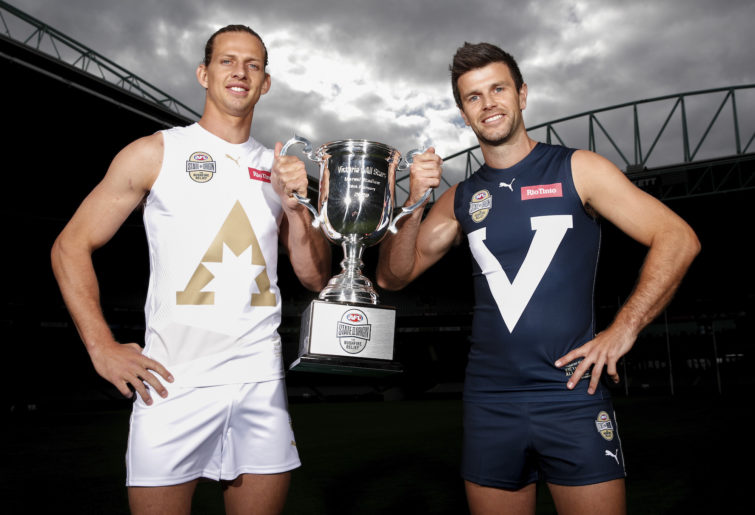
In fact, the Aussie Rules code invented the idea back in 1977 when the first game was played at Subiaco Oval, with WA thrashing the Big V in front of a packed house. The following decades produced some memorable, high-quality and tight clashes between WA, SA and the Vics.
Unfortunately with the development and expansion of the AFL national competition in the late 1980s and 90s, the AFL have allowed the State of Origin idea to slip off the calendar, much to the disappointment of many AFL followers in all states.
Meanwhile the rugby league version has gone from strength to strength and is the annual highlight of their season, claiming the Origin concept as their own.
Case in point is the 2022 game at Optus Stadium that attracted record crowds and was a huge success in a non-rugby league state.
The current AFL competition is not really a true representation of state against state rivalry so prominent in other sports, as players constantly move around the country.
In a recent survey of AFL playing groups 14 of the 16 clubs indicated a strong willingness to play State of Origin football given the opportunity and providing all stakeholders were supportive.
The biggest problem for State of Origin in the past has been scheduling prior to or during the season, as well as the reluctance of clubs and coaches to allow their star players to play in Origin matches during the season, fearing long-term injuries.
But the pre-finals bye offers an opportunity to mitigate this risk: play the match during that week (or even more preferably, during the week of a pre-grand final bye as occurred in 2021), and feature players from all the teams no longer competing for that year’s flag.
Given the pre-finals bye and limited AFL games in capital cities across the country as the finals series rolls on, the State of Origin games could be scheduled to suit, therefore providing an additional two high-quality games each weekend in September, in a city that does not have an AFL final of its own.
At the end of qualifying rounds and during the pre-finals bye in late August/early September, the season is over for the 400 or so players across the ten clubs who miss out on finals.
This State of Origin concept provides an opportunity for the best of those players to keep playing at the highest level for a further three weeks, and if selected, represent their state.

Victoria and the All Stars will do battle for Origin glory. (Photo by Dylan Burns/AFL Photos via Getty Images)
Allowing for each State team requiring 30 players for the State of Origin series, this will provide 120 players with the opportunity to play representative football. It would allow a good chunk of AFL players (subject to injury) who miss finals action with the opportunity to continue playing football in September at State of Origin level, a thought I am sure all footballers would relish, even if this would delay or at least impact their “Mad Monday” celebrations.
As each week of the AFL finals is completed there will be two further teams whose season is over. This will provide an additional pool of 80 potential state players each week from which the states can alter their squad – say a maximum of three player changes per team per week to cover injury and form.
The coaches for the six state teams would be selected from the coaches and assistant coaches from the ranks of the recently retired cohort – think Shane Edwards or Michael Hurley – and could be selected well in advance of season’s end for planning purposes.
The participation rules for State of Origin should be as they were when the concept started in 1977, in that each player must have either been born in their home State or from where they played their first senior game of Aussie Rules.
All the mainland AFL states of Australia – Victoria, South Australia and Western Australia – would participate in competition during the first three weeks of the AFL final series each year, plus a combined NSW, ACT, Northern Territory and Queensland team to ensure the best competition, named NEAFL as a working title.
Each State would play each other once during the first three-week period of the AFL Final series for points and percentage, and the top two teams at the end of the competition will play off in a Grand Final to be declared the State of Origin Champion.
Given the recent passing of a true WA, Australian and AFL Legend, the state teams should play for the Polly Farmer AFL Champions Trophy each year, and the best player will be awarded the Leon Larkin medal (in recognition of the “inventor” of the AFL State of Origin concept).
The fixture would look something like this.
| Finals Week | Date | Game One | Game Two | |
| Week one | Sunday 28 August | VIC vs SA | WA vs NEAFL | |
| Week two | Sunday 4 September | WA vs VIC | SA vs NEAFL | |
| Week three | Sunday 11 September | SA vs WA | NEAFL vs VIC | |
| Week four | Sunday 18 September | Final |
The idea will be to schedule a State of Origin game in a city that does not have an AFL final that weekend, and also on the Sunday, so as not to clash with the AFL final series game on Friday or Saturday.
Each state will host one game during the series, which will obviously be rotated on an annual basis.
This may also provide Melbourne footy fans with an extra game in the event that early finals are played in another city. There have been several examples in recent years where there has been no AFL finals game in Melbourne on week one, and State of Origin can fill this void.
Clearly the AFL grand final is sacrosanct, and it is not suggested State of Origin be played over that weekend.:
As they say, footy will be the winner; and marketing this idea to existing broadcasters, sponsors, stakeholders and spectators will be easy. There will be additional commercial benefits for the AFL through multiple revenue streams, including ticket sales, corporate hospitality, merchandise, venue deals plus additional leverage for the TV rights value.
In addition, consideration should be given to selecting a worthy charity that this State of Origin series could financially support on an ongoing basis.
AFL, as great a game as it is today, still needs to constantly reinvent itself to maintain its national dominance over the other football codes; but as we have seen all the other mainstream football codes are getting their act together and could rapidly close the gap in popularity, particularly post-COVID
When AFLW is a fully matured national competition and a compatible fixture is developed then there definitely should also be a State of Origin series in the women’s game as well.
State rivalry has been built into the psyche of all Australians since Federation and the AFL can no longer allow State of Origin, the concept it created, to disappear completely and rugby league to have sole control over the event.
Therefore this proposal must be considered seriously by AFL decision-makers, and following full consultation with all parties, there is no reason to believe that a State of Origin competition could not be part of the 2023 fixture.
As the great Sam Kekovich always says, “you know it makes sense”…


Leave a Reply